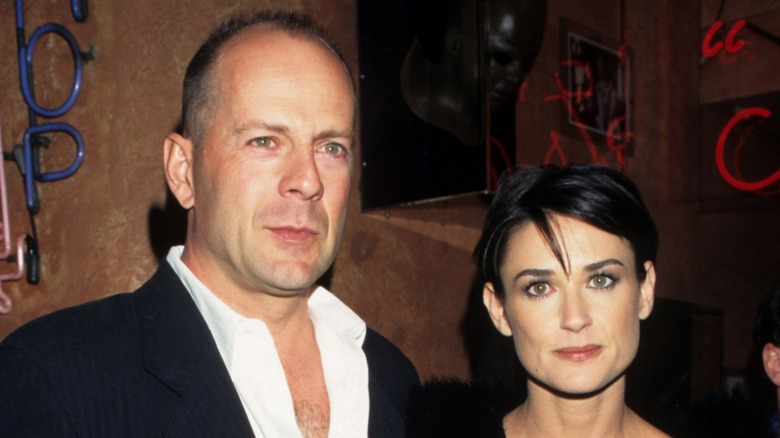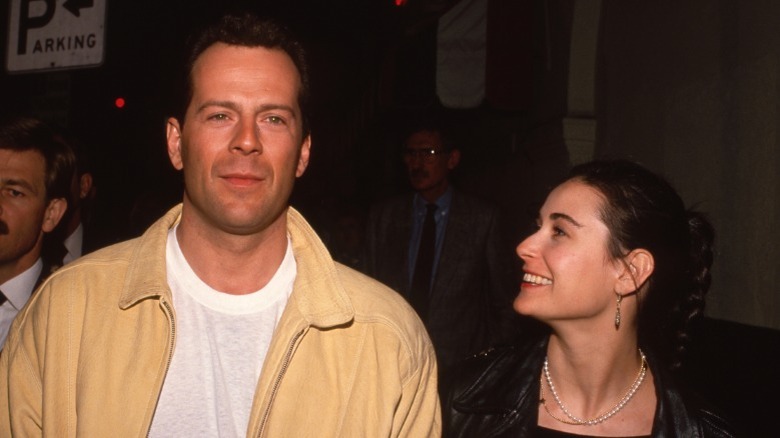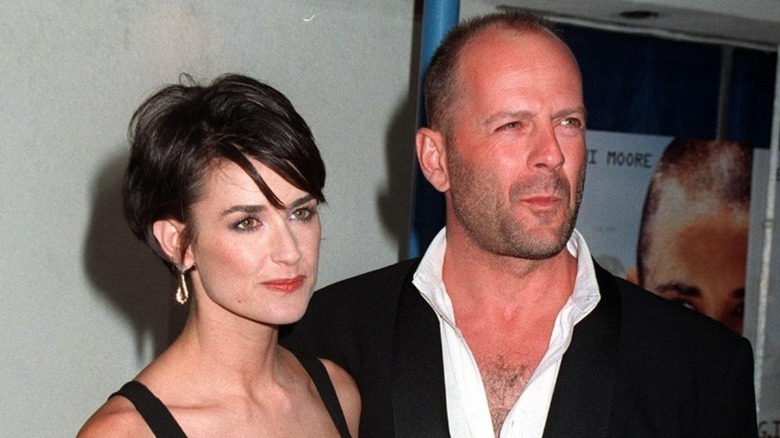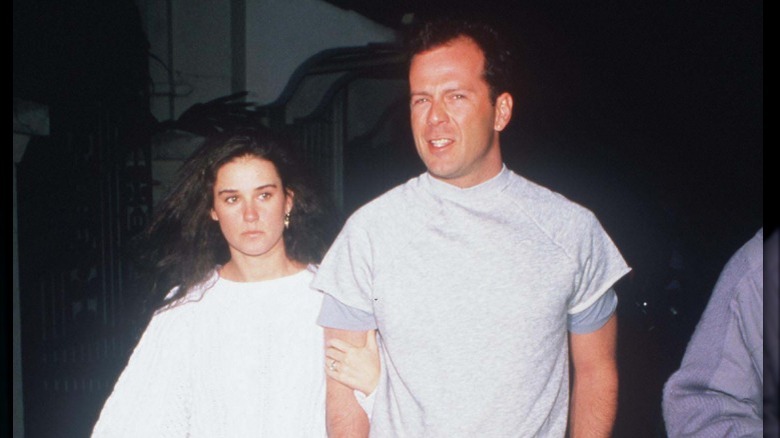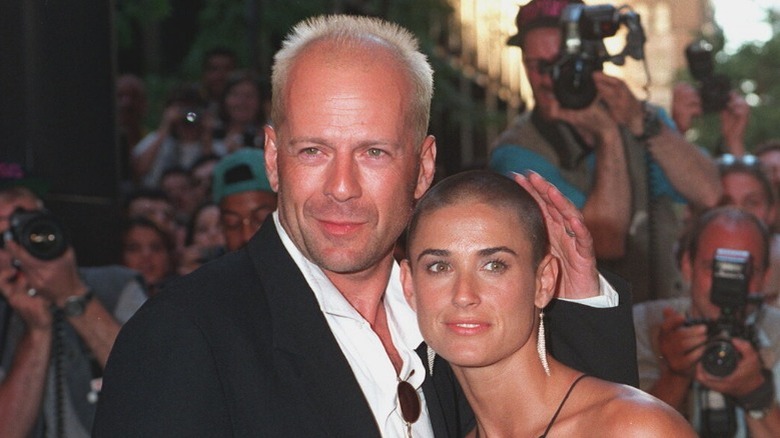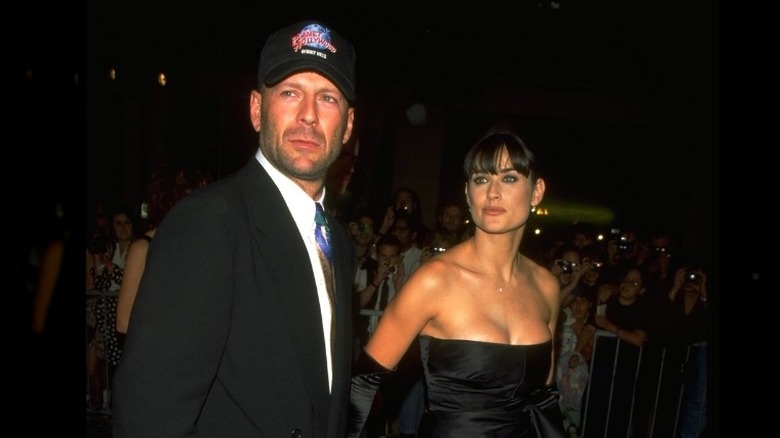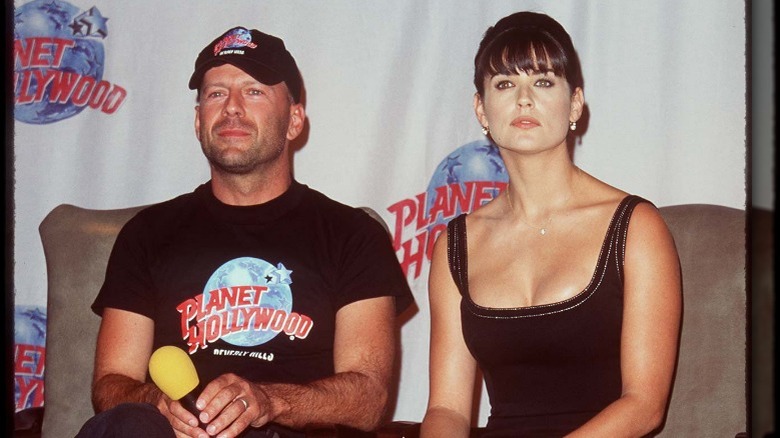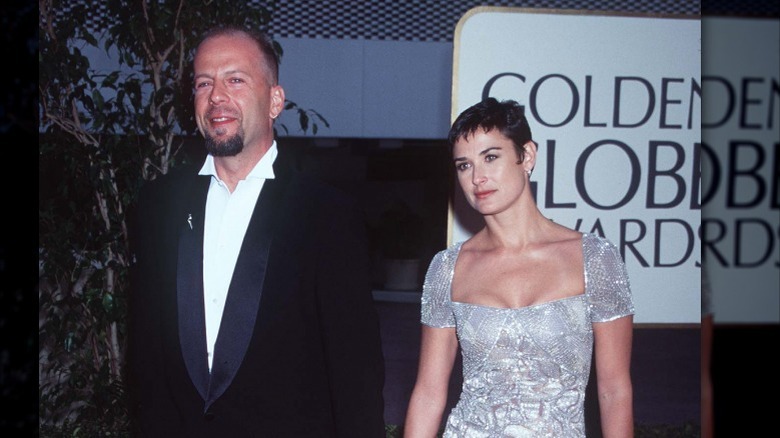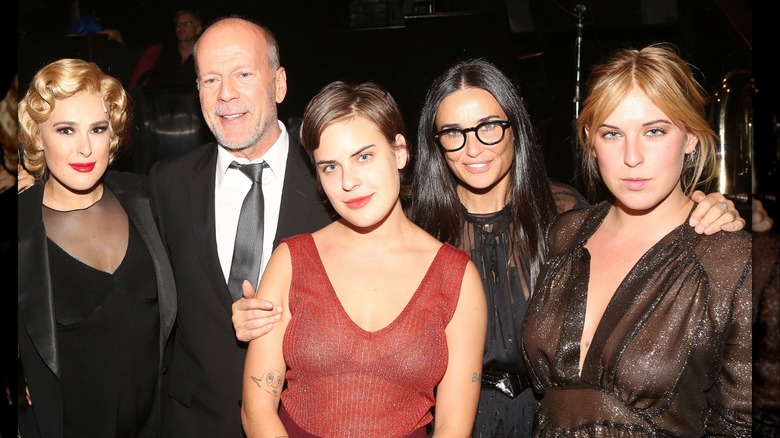Why Demi Moore And Bruce Willis Divorced
We may receive a commission on purchases made from links.
In the late '80s and throughout the '90s, Demi Moore and Bruce Willis were arguably one of Hollywood's most powerful couples. When they met in 1987, Moore was a soap opera star-turned-movie actor on the rise and Willis starred on the hit TV dramedy, "Moonlighting." Just months after meeting, the two wed and shortly thereafter, became parents, too. Certainly, their new romance and family were thrilling, but Moore and Willis would soon shift from promising Tinseltown newcomers to bonafide box office phenoms in a matter of years. Moore starred in hits like "Ghost" and "A Few Good Men," while Willis became an unexpected action star in the genre-defining action blockbuster "Die Hard."
While Moore and Willis thrived professionally, personally, their union fell under the scrutiny of the tabloids, which didn't hesitate to publish rumors about the couple's marital status. Despite the gossip, they discussed their relationship frankly with the media, and it seemed like Moore and Willis were not only dedicated to each other, but to their three daughters, Rumer, Scout, and Tallulah. But relationships are rarely what they seem on the surface, and Moore and Willis' marriage was no exception. Professional stress, personal doubts, and emotional misunderstandings plagued their union, and in 1998, Moore and Willis announced their separation, finalizing their split in 2000. But it turns out, getting divorced was this couple's Hollywood happily-ever-after. Read on to learn why Demi Moore and Bruce Willis divorced and to understand how they made their relationship work on their own terms.
They never had a chance to truly know each other
Within months of meeting in 1987, Demi Moore and Bruce Willis got married and were expecting their first child together. The Hollywood couple quickly bonded over their mutual desire for family and shared ambitions, but after the commotion of their swift romance settled, Moore realized she didn't really know her husband. In her memoir "Inside Out," Moore wrote, "We barely had time to be a couple before we became parents. We had a whirlwind, truncated infatuation that morphed into a full-on family all in our very first year. When reality set in, I don't know if we really knew each other."
The couple faced a serious communication gap early in their marriage shortly after the birth of their daughter, Rumer in 1988. Moore was excited to get back to work, but she quickly found out Willis didn't share her enthusiasm. When she told him about the opportunity to shoot the movie "We're No Angels" in Canada, Moore realized that Willis didn't want her to work outside of their family. Shocked by this revelation, Moore recalled, "I felt way too much anxiety to have a real conversation with Bruce about our assumptions regarding work, gender roles, and parenting—the deep stuff we obviously needed to start figuring out together to have a successful marriage."
They spent too much time apart
By the time Bruce Willis and Demi Moore got married, both actors were on the precipice of superstardom. With movies like "Ghost" and "Die Hard" becoming smash hits at the box office, Moore and Willis became some of the most in-demand Tinseltown thespians. However, the logistical demands of moviemaking meant the couple spent much of their time apart. Although they appeared together in the 1991 thriller "Mortal Thoughts," Moore and Willis mostly pursued their work life separately. Soon, their relationship became less about romance and more about planning. In "Inside Out," Moore wrote of her marriage, "Soon it was just a life of coordinating details, trying to sync our schedules."
By the end of their relationship, Moore recalled, "Bruce was working the whole time I was, and we were disconnected from each other emotionally. Our life was all about logistics surrounding the kids." Shortly after they announced their separation in 1998, sources told People that spending too much apart was at the root of their failed relationship. Other sources corroborated this theory to The Independent UK, telling the publication that their busy global filming schedule had put pressure on their marriage.
Tabloid scrutiny put pressure on their marriage
There's no denying that Demi Moore and Bruce Willis were a 90's Hollywood power couple, but all the fame and fortune came along with unwanted public scrutiny, particularly from tabloid media. Both Moore and Willis received their fair share of scandal-sheet attention on their own — he for his pre-marital arrest after assaulting a police officer and she for her penchant for private jets, among other lavish tastes — but together, they created a media frenzy. Much of the tabloid talk centered around their relationship status, or lack thereof. Moore dismissed reports of Willis' infidelity in a 1991 interview with Vanity Fair. "Do I get jealous? Sure," she said. "But he doesn't do anything to provoke it, so if I do feel that way, it's something going on in my own head."
Although Moore handled cheating rumors nonchalantly early in their marriage, toward the end, things became litigious between the couple and the tabloids. In 1997, Moore and Willis sued Star magazine for publishing what they claimed to be "false, fabricated and defamatory articles" about their marriage (via UPI). That same year, they also initiated a lawsuit against the Australian publication New Idea for releasing their hot take on the couple's alleged rocky relationship. Clearly, the intense media scrutiny didn't help their relationship. Willis confessed to Rolling Stone after their divorce was finalized, "It's difficult to live your life and marriage under a magnifying glass, which is what happens to movie-star couples."
Moore shifted away from Hollywood amid Willis' Hollywood resurgence
In the mid-'90s, both Demi Moore and Bruce Willis' careers hit the box office doldrums with a series of flops. Although Moore raked in an unprecedented $12.5 million to star in the 1996 comedy "Striptease," the movie couldn't shake the negative press and gossip that surrounded it before it was released. While "Striptease" eventually turned a profit, it earned a reputation for being a bad film, so much so that it earned numerous 1997 Golden Razzie Awards, including Worst Picture and Worst Actress for Moore. Her next movie, 1998's "G.I. Jane," garnered more attention for her physical transformation than for her acting prowess, becoming another notable flop on her resume. Meanwhile, Willis experienced box office setbacks with movies like "The Jackal" and "Mercury Rising."
"All the criticism of G.I. Jane and Striptease was a lot to absorb," she wrote in "Inside Out." "The takeaway seemed to be that I had betrayed women in Striptease and betrayed men in G.I. Jane and gotten paid a lot to do it—and that nobody could forgive me for that." After "Striptease" and "G.I. Jane," – and miserable time filming "Passion of Mind" in Paris – Moore retreated to her Hailey, Idaho home and became a full-time mom. Willis' career, however, bounced back, starring in the futuristic action flick "The Fifth Element" and the blockbuster "Armageddon," which would become one of the highest grossing films of his career.
Willis was skeptical about marriage
Early in their marriage, Bruce Willis dropped an emotional bombshell on their relationship: He wasn't sure he wanted to be married to Moore. In her memoir "Inside Out," Moore recalls just before starting production on his film "Hudson Hawk," Willis told her, "I don't know if I want to be married." Moore was blindsided and hurt by the revelation, but Willis didn't leave. In fact, the couple reconciled when they became pregnant with their second child, Scout. Years later, Willis would publicly express his skepticism about marriage in Playboy. He said, "On an emotional level, to think that you are going to find one person who understands what you need right now and is able to give it to you, to anticipate what you will need ten years from now, 20 years from now, 30 years from now—for the rest of your natural f***ing life—is a myth." Wow, what a romantic.
Despite his trepidation regarding the institution of marriage, Willis claimed his relationship with Moore was worth it. "Yes, even with the knowledge that marriage is a myth," he said. "In fact, our marriage works because we both understand that it is a myth to think, I've found the perfect person and my life is fine now." He claimed to be monogamous and seemed committed to making it work with Moore. But as time would tell, Willis' musings on marriage — at least concerning his and Moore's — proved correct.
The allegedly squabbled over business ventures
Whether they were commanding record-breaking movie salaries, investing in chain restaurants, or dabbling in small-town real estate development, Bruce Willis and Demi Moore proved that not only were they a Hollywood power couple, but they also had serious business savvy. In the '90s, both Willis and Moore became investors in Planet Hollywood, a restaurant chain fueled by appearances from its celebrity backers as well as its famous Cap'n Crunch chicken strips. At its height, Planet Hollywood was valued at nearly $2 billion.
Planet Hollywood wasn't Moore and Willis' only restaurant investment. Working as a bartender in New York City before gaining fame, Willis poured money into his adopted hometown of Hailey, Idaho. Dubbed "Willisville" by locals, the Hollywood star reportedly spent $7 million on improvements to the town, including Main Street refurbishments, a nightclub, and a diner. He also had dreams of real estate development in New Jersey, with hopes of developing it into a $50 million amusement area. As robust as their investment portfolio may have seemed, it didn't stop the couple from fighting over it. Sources at People reported that at Shorty's, their Hailey restaurant, Moore allegedly "stood up, slammed her hands on the table and said, 'I'm sick of your bull and your companies!' and walked out." Maybe she just wanted Cap'n Crunch chicken strips on the menu? Doubtful.
Both had alleged trysts with young Hollywood stars
Throughout their marriage, plenty of cheating rumors swirled around Demi Moore and Bruce Willis, and toward the end of their union, both actors were accused of stepping out with young Hollywood stars. In 1997, Moore was rumored to have hooked up with Leonard DiCaprio who, by the end of the year, would reach an astronomical level of fame with the release of "Titanic." But when The National Enquirer reported on their weekend tryst, DiCaprio was just another "young Hollywood hunk" who just happened to spend the night at Moore's Malibu home.
Around the same time, Willis was linked to a different rising star – his "Armageddon" co-star Liv Tyler. Even though she played his daughter in the film, it didn't stop rumors about a possible affair between the two actors. Tyler denied any romance to The Scottish Daily Record (via The Free Library). Speaking on Willis' behalf, Tyler said, "Bruce is fed up with all the lies that have been printed about him. It kind of destroys your spirit to hear a lot of stories which cause a lot of pain to the people involved." Tyler shut down rumors of a Willis affair, but sources at People told a different tale. Rumor has it that Willis flew Tyler out to their Idaho estate on the couple's private jet, much to the chagrin of Moore.
They wanted to be good parents for their children
Demi Moore and Bruce Willis finalized their divorce in 2000 and while their split proved difficult, Moore found pride in its amicable resolution. In "Inside Out," Moore wrote, "It wasn't easy at first, but we managed to move the heart of our relationship, the heart of what created our family, into something new that gave the girls a loving, supportive environment with both parents." Willis was equally dedicated to the family he and Moore made. Shortly after their divorce was finalized, Willis told Rolling Stone, "I still love Demi. We're very close. We have three children whom we will continue to raise together, and we're probably as close now as we ever were. We realize we have a lifelong commitment to our kids. Our friendship continues. The institution has been set aside."
Not only did Moore and Willis remain emotionally close, but they also stayed physically near each other. Willis bought property across the street from their Hailey, Idaho home, enabling their kids to be with both parents with minimal interruption. Their eldest daughter, Rumer, praised her parents for prioritizing an amicable co-parenting relationship. She said to People, "I'm incredibly grateful that both of my parents have made such an effort my entire life that I never felt like I had to choose between them."

